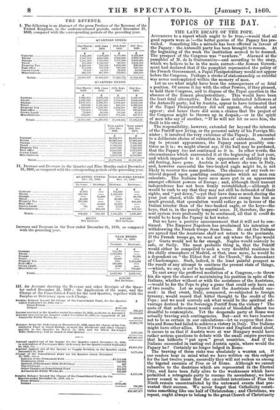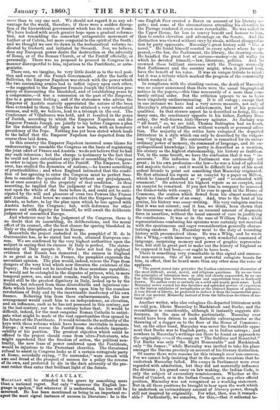TOPICS OF THE DAY.
THE LATE ESCAPE OF THE POPE.
ACCORDING to a report which ought to be true,-would that all good reports were so !-the better genius of the Papacy has pre- vailed. Something like a miracle has been effected in favour of the Papacy : the Antonelli party has been brought to reason. At the beginning of the week the institution seemed to be doomed. The prospect of the Congress was "nowhere." Alarmed at the pamphlet of M. de la Gueronniere-and according to the story, which we believe to be in the main correct-the Roman Govern- ment had declared that if the pamphlet represented the policy of the French Government, a Papal Plenipotentiary would not appear before the Congress. Perhaps a stroke of statesmanship so suicidal was never contemplated within the memory of man.
Let us see what might have been the consequences of so fatal a position. Of course it lay with the other Powers, if they pleased, to hold their Congress, and to dispose of the Papal question in the absence of the Roman plenipotentiary. This would have been
the least fatal alternative. But the more infatuated followers of the Antonelli party, led by Austria, appear to have intimated that if the Papal Plenipotentiary did not appear, they should not appear ; and hence there did seem a chance that the project of the Congress might be thrown up in despair,-or in the spirit of men who say,of another, "If he will not let us save him, the fault is his own."
The responsibility, however, extended far beyond the interests of the Pontiff now living, or the personal safety of his Foreign Mi- nister; it involved the very existence of the Papacy. It amounted to a deliberate choice of extinction in lieu of extension. Accord- ing to present appearances, the Papacy cannot possibly con- tinue as it is ; we might almost say, if the bull may be pardoned, that the Papacy has not continued as it is. In other words, the circumstances which surrounded it at the beginning of last year, and which imparted to it a false appearance of stability on the old footing, have gone. Austria is not where she was in Italy, and, however successful the two-beaked eagle might be, is not likely to recover the same position. The chances of any such re- trieval depend upon gambling contingencies which no man can calculate. The Italians have once more put in an appearance amongst efficient powers of Europe ; and, although their nascent independence has not been firmly reestablished,-although it would be rash to say that they may not still be defrauded of their rights, and "put down,"-yet they have done so much during the year just closed, while their most powerful enemy has lost so much ground, that speculation would rather go in favour of the Italian tricolor than of the two-beaked eagle, or the keys-the keys, that is, in the purely temporal sense. If, therefore, the pre- sent system were professedly to be continued, all that it could do would be to keep the Papacy in hot water. But we have a positive announcement that it will not be con- tinued. The Emperor Napoleon has proclaimed his intention of withdrawing the French troops from Rome. He and the Italians are agreed that the Austrians shall not return to the peninsula. If the French troops go, we need not ask where the Pope would go ? Gaeta would not be far enough. Naples would scarcely be safe or Sicily. The most probable thing is that the Pontiff would either be compelled to seek a very doubtful residence in the chilly atmosphere of Madrid, or that, once more he would be a dependent on "the Eldest Son of the Church," the descendant of Charlemagne. Such, indeed, is the least painful prospect as the result of any attempt to continue the present state of things, -which, we say, is not to be continued. To cast away the proffered mediation of a Congress,-to throw his die upon the chance of maintaining his position in spite of the Italians, whether without or with the assistance of the Austrians, -would be for the Pope to play a game that could only have one of two results. Let us suppose that the Austrians should sue- aced: in that event, Italy, conquered, re-subjected to foreign tyranny, would record that bitter thought to the credit of the Pope ; and we need scarcely ask what would be the spiritual ad- vantage derived to the Sovereign Pontiff from the victory ? The costs of that achievement would consist of bloodshed almost too dreadful to contemplate. Yet the desperado party at Rome was actually braving such contingencies. But-and we have learned not to be so certain in our calculations-let us suppose that Aus- tria and Rome had failed to achieve a victory in Italy. The Italians might have other allies. Even if France and England stood aloof, it occurs to us that if Austria were at war Hungary would have rather serious questions to debate with the small empire province that has hitherto "put upon" great countries. And if the Italians succeeded in casting out Austria again, where would the Papacy be ? Certainly no longer lodged in Rome. The braving of these risks was absolutely a wanton act. If our readers bear in mind what we have written on this subject for the last twelve years, assuredly theywill not reckon us among the bigoted enemies of Pius or of Rome. Although we cannot subscribe to the doctrines which are represented in the Eternal City, and have been fully alive to the weaknesses which have permitted a retrograde party to resume its ascendancy, we have never ceased to insist that the excellent intentions of Pius the Ninth remain uncontradicted by the untoward events that pre- vented their success. We never forget that Catholicity consti- tutes something like one half of Christendom ; and Christians, we repeat, ought always to belong to the great Church of Christianity
more than to any one sect. We should not regard it as any ad- vantage for the world, therefore, if there were a sudden disrup- tion of the hierarchical government which has its centre at Rome. We have looked with much greater hope upon a gradual reforma- tion, not resembling the somewhat antagonistic movement of Luther or of Calvin, but more congenial to the spirit of the South ; and we thought we saw its dawn in the ecclesiastical reforms in- dicated by Gioberti and initiated by Sicoardi. Nor, we believe, does any European power desire the destruction or the adversity of Rome, or of the Roman Church, or of the Pontiff officially, or personally. There was no proposal to proceed in Congress in a manner disrespectful to him, injurious to the Pontificate, or anta- gonistic. There can, we imagine, be very little doubt as to the real posi- tion and course of the French Government. After the battle of Solferino, the Emperor Napoleon was struck with the power which the two contending armies had to inflict injury upon each other, —he suggested to the Emperor Francis Joseph the Christian pro- priety of discounting the bloodshed, and of establishing peace by a oompromise,—it was a concession on the part of the Emperor, due to a generous feeling ; and if the statesmen who advise the Emperor of Austria scarcely appreciated the nature of the boon thus extended to them, it has thus far attained a very substantial success, and will, we believe, lead to a triumph in the end. The Conference of Villafranea was held, and it resulted in the peace of Zurich, according to which the Emperor Napoleon and the Emperor Francis Joseph are jointly to lay before Congress a plan for the federation of Italy upon a new basis, with an honorary presidency of the Pope. Nothing has yet been stated which leads to the belief that the Emperor Napoleon has departed from the course thus laid down.
In this country the Emperor Napoleon incurred some blame for endeavouring to assemble the Congress on the basis of registering the joint edict of France and Austria : we do not believe that he had any such intention ; but the charge is testimony to the fact that he could not have entertained any plan of assembling the Congress in order to injure the position of the Pontiff. The Emperor, how- ever, has studied the dynamics of nations,—he knows something of praoticabilities ; and when England intimated that the condi- tion of her agreeing to enter the Congress must be perfect free- dom to consider the question of Italy without any prejudgment, he at once assented to the propriety of that condition. In thus assenting, he implied that the judgment of the Congress must rest upon the whole of the facts before it, and could not be anti- cipated by the will and pleasure of even two Powers like France and Austria. And hence we conceive that the Emperor Napoleon intends, as before, to lay the plan upon which he has agreed with Austria before the Congress ; but, with deference for other powers and with dignity for himself, he will await the deliberate judgment of assembled Europe. And whatever may be the judgment of the Congress, there is no doubt that its assembling, its deliberations, and the moral effect of its counsel, offer the best chance for sparing bloodshed in Italy or the disruption of peace in Europe. Meanwhile the project embodied in the pamphlet of M. de la Gueronniere has, as we stated last week, attained European suc- cess. We are confirmed by the very highest authorities upon the subject in saying that its success in Italy is perfect. The states- manship of Italy accepts it. We have not had the slightest evidence that Russia has demurred ; the success in England is as great as in Italy ; in France, the pamphlet expounds the ascendant opinion. The plan would, indeed, rescue the Pope from
dangers of the very kind which now threaten the existence of the
Papacy. He would not be involved in these mundane squabbles ; he would not be entangled in the disputes of princes, who, in mere temporal power, are, and must remain, vastly his superiors. He would still be the greatest dignitary in Italy, looked up to by the Italians, but released from those discreditable and injurious con- flicts which have hitherto been drawn upon him by the ceaseless revolutions of Italy and by the inextricable insolvency of his own finance. Relieving him from these embarrassments, the new arrangement would exalt him to an independence, an elevation, and an influence, such as he has not possessed in this century, nor in the last century, nor in the century before that. It would be difficult, indeed, for the most sanguine Roman Catholic to antici- pate what might be made of the vast opportunities thus opened to the future of the Pontificate. It would reconcile the authority of the keys with those reforms which have become inevitable in modern Europe ; it would rescue the Pontiff from the obsolete impracti-
cability of his position. The greatest objection which could be offered to the project should come from ultra-Protestants, who inght apprehend that the freedom of action, the political neu- trality, the new lease of power conferred upon the Pontificate, would be injurious to the Protestant churches. The threatened
refusal to assist in Congress looks as if a certain retrograde party at Rome, suicidally crying, " No surrender," were struck with awe and dread at the prospect of success for a policy the reverse of its own, and preferred to die in the dark adversity of the pre- sent rather than enter that brilliant light of the future.



























 Previous page
Previous page